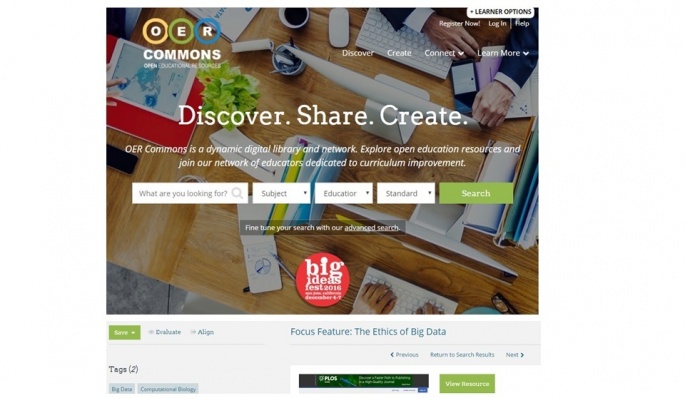Open Educational Resources: the future of Education, co-created with You
25/11/2016

.jpg)
Open Educational Resources (OER) Commons is an open online library allowing you to search and discover OERs and other freely available instructional materials. The OER Commons infrastructure facilitates evaluation of content and its alignment to education quality standards.
OER Commons infrastructure was launched in 2007 by a nonprofit Institute for the Study of Knowledge Management in Education (ISKME) dedicated to: innovation in open educational practices and new research focused on OER; development and promotion of models for OER sustainability. OER Commons was created as part of the Foundation’s worldwide OER initiative focused on aggregation, sharing, and promotion OER to educators, researchers, administrators, and students
OER Commons works with the finest producers of instructional content in the world and gathers their best work together especially for you. Register, log in and discover OER Commons curated Collections.
Test search filters (e.g., Subject Area: Life Science – Career/Technical – All Conditions of Use – Education Standards – Resource Evaluation Criteria – Language, etc.) to identify, access and retrieve OER you could be interested in.
OER teaching and learning resources can be freely used and reused at no cost, and without needing to ask permission. Unlike copyrighted resources, OER have been authored or created by an individual or organization that chooses to retain few, if any, ownership rights. OER often have a Creative Commons license or other permission to let you know how the material may be used, reused, adapted, and shared.
While engaging trusted content providers, educators (organizations, consortia, states, districts, etc.) and learners in new participatory processes and effective technologies for engaging with learning, ISKME's OER initiative provides them with OER Services/tools to:
- create OERs (on your own, or with others) and add particular expertise to the wider community;
- align OER to the Common Core State Standards Initiative;
- evaluate the quality of OER to OER Rubrics (see also: iRubric: Evaluating OER rubric);
- contribute to and share OERs with other teachers and learners, at the forefront of a new educational era.
Moreover, OER Commons platform offers personalized OER Commons Hubs, Customized Microsites, and OER Training Programs.
To learn how OER Team can help your organization leverage OER, contact OER’s services specialist: Mindy Boland ([email protected]).
Source:
|
“Open educational resources (OER) are freely accessible, openly licensed documents and media that are useful for teaching, learning, and assessing as well as for research purposes. It is the leading trend in distance education/open and distance learning domain as a consequence of the openness movement” (Wikipedia). As a part of the 17 UN Sustainable Development Goals (SDGs), the global education agenda - Education 2030 Framework for Action, Target 3, point 43 states that: “A well-established, properly-regulated tertiary education system supported by technology, Open Educational Resources (OERs) and distance education modalities can increase access, equity, quality and relevance, and narrow the gap between what is taught at tertiary education institutions and what economies and societies demand” (International Council for Open and Distance Education). “Research suggests that moving from traditional books to OER reduces costs and improves student outcomes” (Impact of OER). "Study after study continues to affirm that OER usage reduces costs without reducing (and often while increasing) student outcomes. The most recent study I’ve seen is here (h/t to @actualham for the pointer): Savings without sacrifice: A case report... (PDF Download Available) Full-Text Paper (PDF): Savings without sacrifice: A case report on open-source textbook adoption <https://www.researchgate.net/publication/324088320>. This is important in part because concerns about “quality” are one of the most common first round objections to OER usage. But it’s also important because folks keep doing these studies and seeing the same results — it’s not a one-off", - [email protected] |
Might also be of your interest:
- The 50 Most Popular MOOCs of All Time
-
Smart Learning and Open Access (recorded webinar)
- Investing in the Future of Open Educational Resources (OERu: Coordinated by the OER Foundation, is an independent, not-for-profit network that offers free online courses for students worldwide)
- Open Education Platform discussion group <[email protected]>
Online courses:
- MOOC list (offered by the best universities and entities)
- A short FAQ to explain the a new rule permitting faculty and staff creating MOOCs to copy short clips from video media protected by digital locks
- edX online platform
- Iversity online plattform
- OpenHPI MOOC-Platform
- Udacity platform from Google
- Futurelearn MOOC platform
- COURSERA platform (e.g., courses: *RESEARCH DATA MANAGEMENT & SHARING online course; *Learning How to Learn: Powerful mental tools to help you master tough subjects):
- UN training and E-Learning courses offered
- UN online courses (including MOOCs) on environmental education
- The Information Management Resource Kit (IMARK)
- FAO of the UN E-learning Centre
- AIMS.FAO.ORG e-learning courses
- GODAN e-learning course on Open Data & Research Data Management in Agriculture and Nutrition
- FREE ONLINE COURSE : MANTRA - how to manage digital data as part of your research project
- FREE USGS Data Management Training Modules : many of the practices are applicable to any discipline
- Essentials 4 Data Support is an introductory course for those people who (want to) support researchers in storing, managing, archiving and sharing their research data
